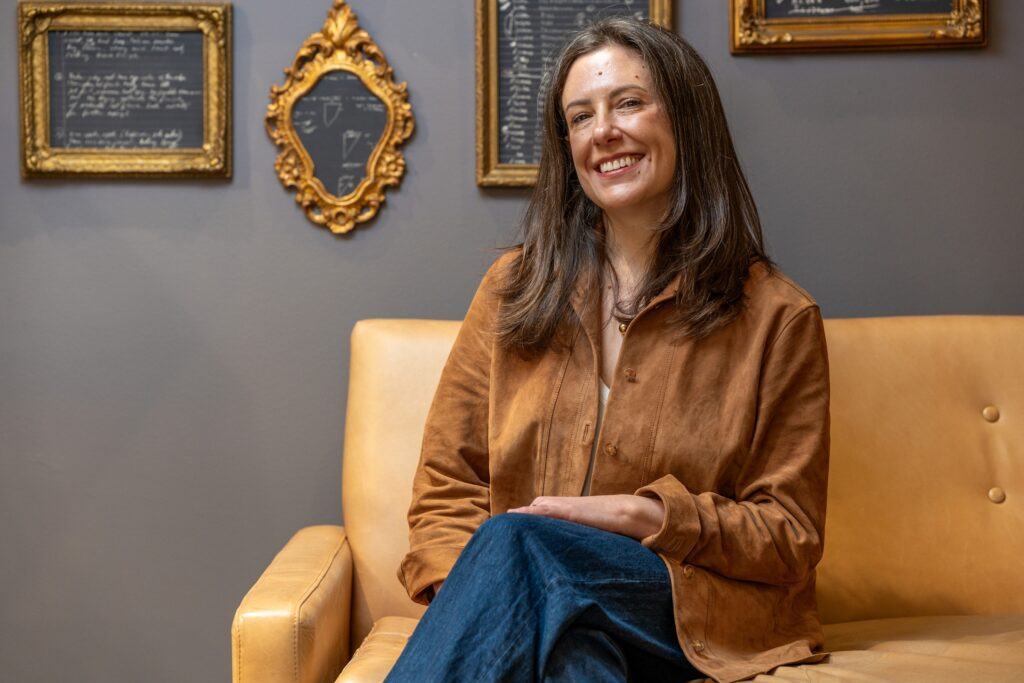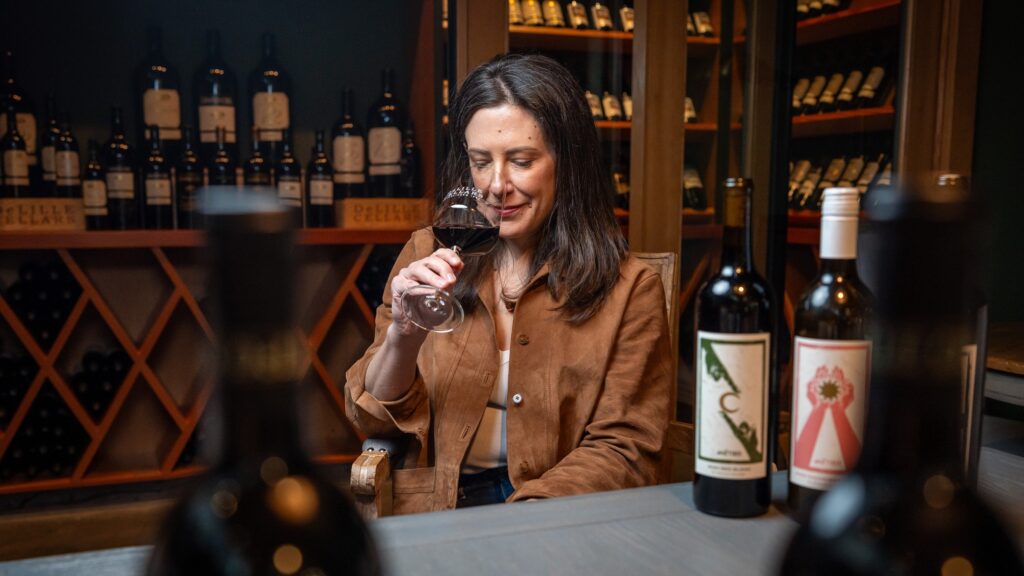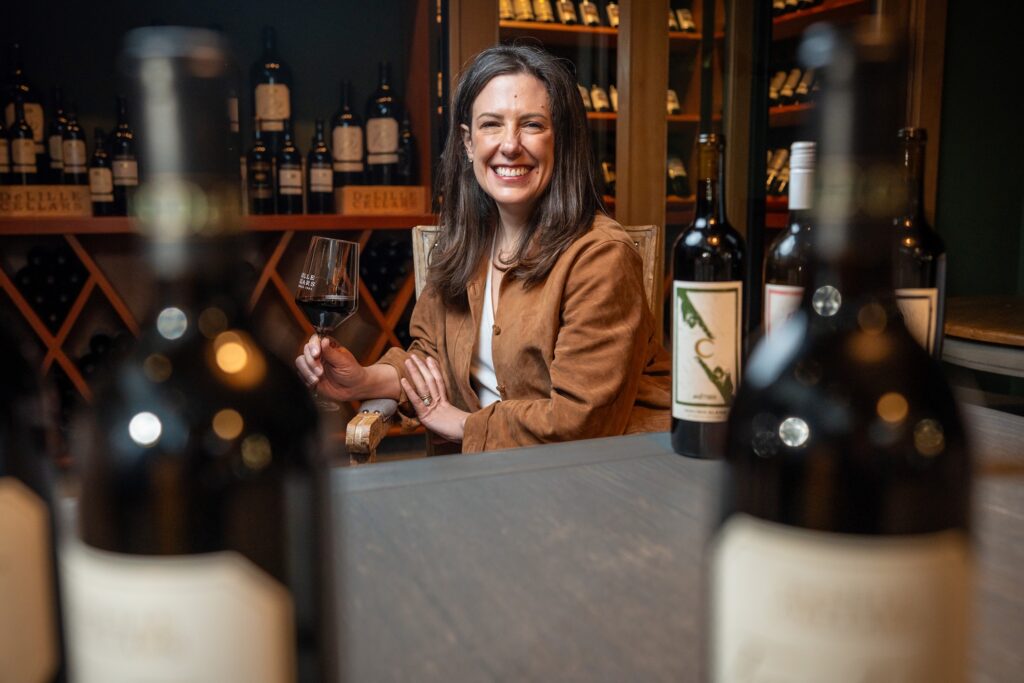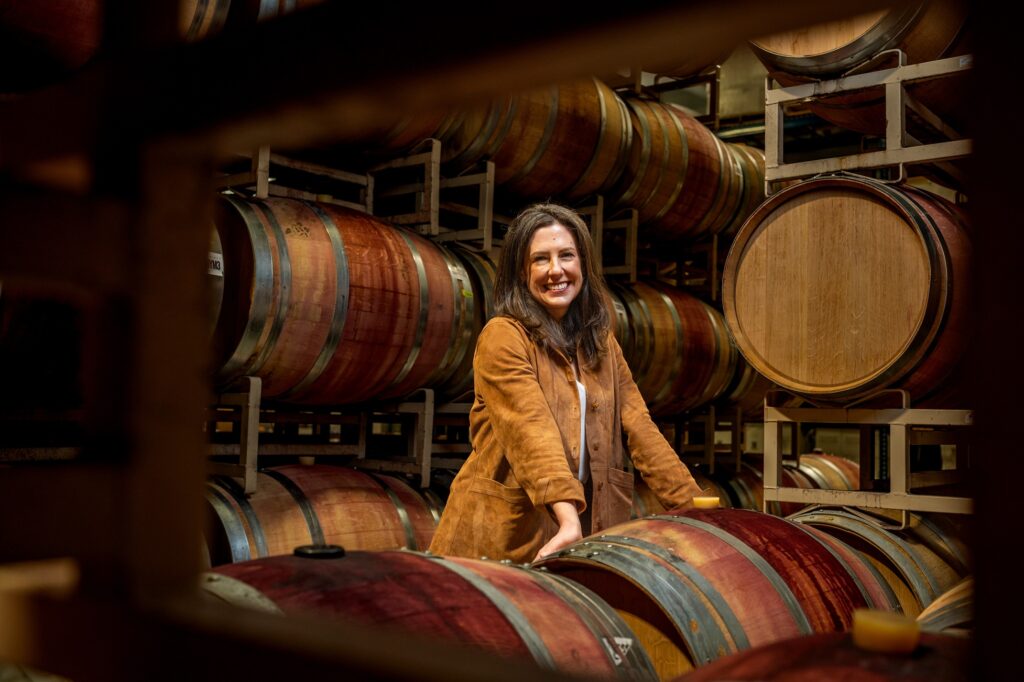Janna Rinker Is Using an MBA to Think Bigger in the Wine Industry
Experience taught Janna Rinker how to sell wine. An Executive MBA taught her how to lead.
After nearly 20 years in the wine industry, Janna Rinker (MBA 2022) had built a career she was proud of—national accounts, export projects, and top-tier wineries. But as her responsibilities grew, so did her ambition to lead at a more strategic level.
“I was great at wine sales, but I wanted to be more involved with business strategy,” she recalls. “I realized I needed more of a foundation, especially if I eventually wanted to start my own project or be involved at the leadership level.”
That realization brought her to the Executive MBA program at the University of Washington Foster School of Business. Rinker knew wine but hadn’t been steeped in the financials, strategy, or operations that drive businesses forward. In the Foster Executive MBA program, she learned those essentials. Equally significant, she had the opportunity to engage with classmates from diverse industries.
Today, she’s the Vice President of Sales at DeLille Cellars, a leading Washington winery known for its Bordeaux-style blends.

A timely opportunity to pursue an MBA
Rinker had long considered an Executive MBA, but the decision became clear in 2020 when the pandemic struck. Her travel schedule halted, and she suddenly had time to reflect.
“I had two kids, dogs, a husband, a house, and a job at a major winery. But everything slowed down for a minute,” she recalls. “And I thought, if there ever was going to be a time in my life to do this, this might be it.”
She researched her options, including wine-focused MBA programs in California, but quickly decided she wanted something broader.
“What drew me to the Foster Executive MBA was the experience of being around people who weren’t only in the wine business, people who had dramatically different work experience,” she says. “I wanted to be exposed to more industries and people who thought differently about the world.”
Why Foster stood out among MBA programs
Growing up in the Northwest, Rinker was already familiar with the University of Washington. “My parents met at the University of Washington as undergrads,” she says. “So, there was a pull there. But, more importantly, the Foster School has such a strong reputation.”
She explored Foster’s other MBA formats but chose the monthly Executive MBA cohort for its immersive structure and in-person connection.
“I’m a relationship person. I come from sales, and for me, that was important,” she recalls. “The cohort model was attractive. I could be present. I could plan ahead and make sure I was focused.”
Despite the unique challenges of being online for her first year due to COVID-19, she successfully fostered meaningful relationships among her cohort.
“The Executive MBA program directors discuss the ‘special sauce’ when building the cohort groups, bringing together students with different backgrounds. For our small team, it worked,” she says. “We weren’t all good at the same thing, and we didn’t come from the same professional background, so we helped each other level up. I became the de facto marketing person, another group member became the financial analyst, and another brought entrepreneurial expertise. We balanced each other out.”

A class project becomes a best-selling wine
One of the most direct outcomes of Rinker’s Executive MBA experience was the creation of Métier, a new line of wines she developed during the program and brought to life at DeLille Cellars.
“In one of our marketing classes, I worked on the new product for DeLille,” she says. “Then I worked on it again in an entrepreneurship class. It was an opportunity to build a product from the ground up and learn while doing.”
By the time the company was ready to greenlight the new project, Rinker had already prepared the business case.
“I had fleshed out all the work for our CEO and ownership group and provided data, analytics, and market research that I wouldn’t have had otherwise, drawing from the experts that surrounded me in class,” she says. “As a result, the wine was born.”
Métier includes three wines and is positioned as an affordable splurge. While most DeLille wines start at around $40, Métier retails for under $25. It’s now widely available in Washington at QFC, Safeway, Costco, and by the glass at restaurants.
“My Executive MBA team still sends me pictures of it when they see it ‘in the wild’ in stores,” she says. “Métier ‘spottings’ appear frequently in our group chat.”

From national sales to strategic growth
After graduating in 2022 with her Executive MBA, Rinker was promoted to vice president of sales. Her role at DeLille expanded from managing major accounts to shaping company-wide strategy. Today, Rinker leads the growing national sales team and continues to expand DeLille’s domestic and international reach. In addition to strong sales in Washington, the winery’s top markets include Texas, California, Florida, and Arizona. Internationally, Japan and South Korea lead the way.
“During the Executive MBA, I started to think more strategically, and even more so afterward,” she says. “Now, I’m always trying to figure out different ways that we can develop and grow new revenue streams.”
One of those ideas is now a major project: a new DeLille Cellars location offering a restaurant, wine flights, bottle shop, and more in Seattle’s University Village, just a few minutes from the University of Washington campus. DeLille’s University Village location will open in summer 2025.
“I was introduced to the CEO of University Village, kickstarted the project, and am part of the team bringing it to fruition,” she says. “It’s a 6,500-square-foot restaurant. I don’t think our leadership team would have predicted we’d be opening something like that a few years ago. But I saw a great opportunity and drove it forward.”

Lessons from the Executive MBA classroom
Rinker still remembers the first Executive MBA class that shifted her thinking: General Management and Strategy with Professor Charles Hill.
“I had an a-ha moment listening to him talk about why businesses succeed or fail,” she says. “I loved how he approached things from a storytelling perspective and with humor.”
She also appreciated the practical approach to finance.
“I was never a math person, but our Financial Management professor made it easy to understand—he also made it fun,” she says. “We did case studies on real businesses. We looked at a hardware store near Winthrop, Washington, and the professor called his friend—the owner—during class to find out his decision about a loan we were studying. It made it much easier to learn and much easier to apply to business.”
Guest speakers added another layer. “Ariane Gorin, the CEO of Expedia, was a guest speaker in one of our classes. She shared insights about sitting on a board and leading through a pandemic,” Rinker recalls. “Her style of leadership was fascinating. It made me think from a different perspective.”
Challenging the status quo
One of Rinker’s biggest takeaways is how the Executive MBA program forced her out of familiar business routines.
“When you’ve been in the same industry for 15 or 20 years, you kind of fall back into groupthink,” she says. “You’re like, ‘This is how we do it,’ and nobody questions you.”
That changed at Foster.
“Being around people from other industries—a military veteran, a physician, a tech exec—it was so good for me,” she says. “They questioned everything and asked unexpected questions that I never would have imagined. And I loved that.”
For Rinker, the Executive MBA wasn’t a path to change industries. It was a way to lead within hers.
“I didn’t do this to leave the wine industry. I wanted to be more valuable to my organization and my industry,” she says. “In wine, many people have only ever been in the wine business. If you can think bigger and think differently, that brings tremendous value.”
Learn more about the Executive MBA program at the University of Washington Foster School of Business here.
